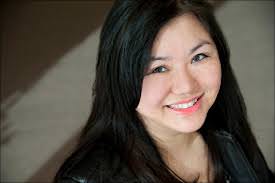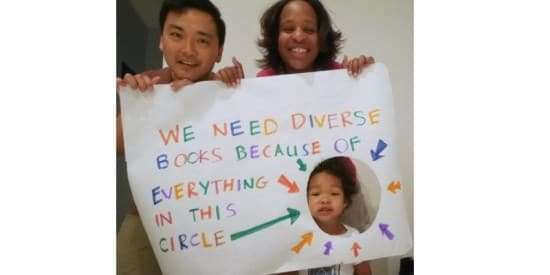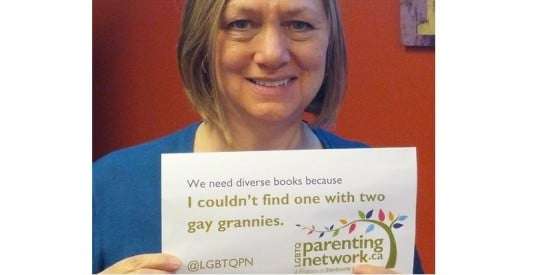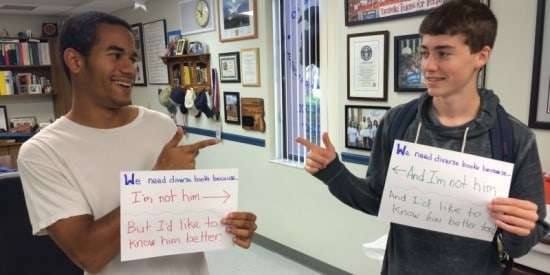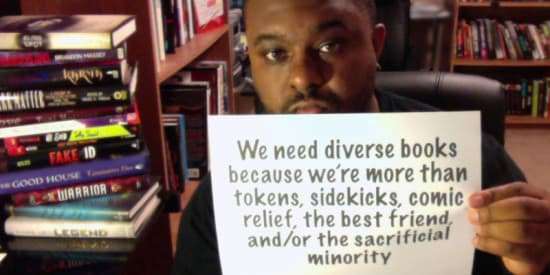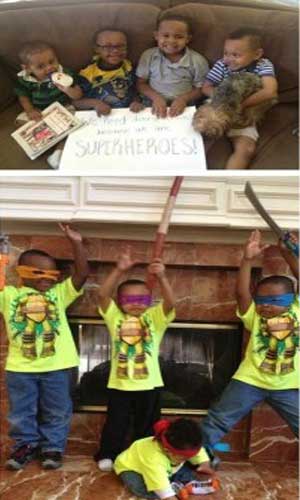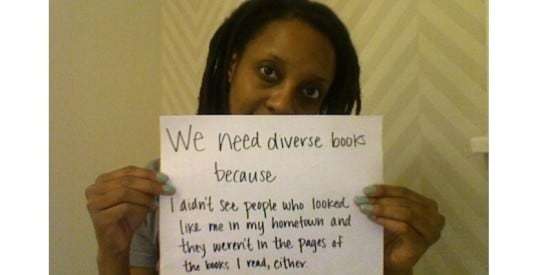Ellen Oh is one of the founders of We Need Diverse Books, a nonprofit organization that promotes diversity of multiple forms in children’s literature and publishing. She recently took to twitter to voice her dreams of more support for Asian American children’s book authors and illustrators with the stardom Crazy Rich Asians has been enjoying, both on page and screen.
Representation matters to impressionable children as Ellen Oh pointed out in one of her tweets, “I didn’t see myself in any positive way as a child growing up in the states. It wasn’t until Joy Luck Club, written by an Asian American woman, that I finally understood the importance and the desperate need for representation.”
Hopefully, passionate advocates for this kind of representation like Ellen Oh and the popularity of Crazy Rich Asians will serve as a rallying call for these authors and illustrators, but the larger market must also understand its importance. A while back BookTrib interviewed Ellen Oh on her organization and its impact on readers.
![]()
If you’re a frequent Twitter user, then you’ve probably already heard of We Need Diverse Books. The phenomenon hit social media last year, shortly after BookCon announced a panel, “Blockbuster Reads: Meet the Kids’ Authors That Dazzle,” which only featured white men. A few YA authors, including popular fantasy author Ellen Oh, refused to take this sitting down. Along with 22 other authors, publishers and bloggers, she organized a campaign designed at bringing diversity and awareness to children’s literature. From May 1 to 3, 2014, readers, authors, and concerned citizens were encouraged to take action, including holding up cue cards completing the sentence: “We need diverse books because…”
The response was immediate: #WeNeedDiverseBooks went viral, with thousands of users posting their photos and support. Bestselling authors such as John Green, Gayle Forman and Jodi Picoult participated, and the hashtag was trending by April 29. Since then, We Need Diverse Books has only grown, and their mission—to continue to bring much-needed diversity into children’s literature—is stronger than ever. BookTrib recently had the pleasure of chatting with Ellen Oh, the president of the We Need Diverse Books organization. Read on to find out where this campaign began, and how you can become a part of it:
Ellen Oh: I was at Nova Teen Book Festival in March of 2014 and I was on a panel that just happened to have Lamar Giles and Meg Medina on it too. And it wasn’t a diversity panel! For the first time, there were more authors of color on a stage together, and we loved it. And I remember talking to them and thinking, we needed this to happen more often. We needed this to be the norm, to have authors of color at every panel representing our stories. Meg has always been a huge advocate for diversity and Lamar and I had been talking about the problem for a long time. So I remember telling them both that we had to do something really big this time to break the status quo and make change happen. And they were both like, cool, I’m in.
And then BookCon happened. The outrage was swift and intense and I got on Twitter and started ranting about it with Malinda Lo, who is another key figure in the diversity movement. But this time, I kept talking about doing something big and a whole lot of people joined in on the conversation and said, “Let’s do it!” But what is it?
Right at that moment, I didn’t know. But it was while visiting my dad, who’d suffered a major stroke earlier that year, that the idea hit me. You see, my dad couldn’t talk and was left paralyzed. His memory was also gone. But when I showed him photos of his grandkids, he would focus so hard on them. It made me realize how important the visual was. And just like that, the really big idea crystallized. The idea of using social media and visuals and cue cards and letting people tell their own story about why we need diverse books.
BT: In what specific ways is We Need Diverse Books reaching out to the community to create change?
EO: Gosh, every single one of our initiatives does exactly that. The Walter Dean Myers Award is dedicated to raising the profile of distinguished diverse books that tend to be ignored by the other awards. Although this year we saw a huge and positive change in the ALA awards ceremony. So many amazing diverse books and authors were recognized and awarded this year. I couldn’t have been happier and prouder of all our amazing librarians and their support of diversity. And our Walter Dean Myers grants will help writers and illustrators from marginalized communities while our internship program, helmed by the amazing Linda Sue Park, is all about helping diverse applicants intern in publishing by providing matching grants. We are also designing educational tool kits with the School and Library Journal, bringing diverse authors into Title 1 classrooms with An Open Book Foundation, and our festival is in the works for next year. Everything we do is geared directly for our community. We are all volunteers putting in a lot of time, energy and effort because we believe passionately that we can make a difference.
BT: Right now the organization is focused on bringing diversity to children’s literature. Why specifically focus on that age group? Do you think there’s more diversity in adult literature?
EO: The reason why we focus on children’s literature is twofold. First of all, as the CCBC has shown so damningly in their yearly statistics, diversity in children’s literature has been abysmal for years. We are failing all of our children by not providing them an accurate representation of the world at large. Secondly, we know that education is key in our battle against racism, sexism, ableism, prejudice, and hate. The more diversity that children are exposed to from a young age, the more likely they will learn empathy and tolerance. We still have a lot of casual racism and micro-aggressions that happen in our society and most stem from ignorance. But the more we expose our kids to other cultures, lifestyles, religions, different from their own, the more we help them grow into better people.
BT: As a young adult author yourself, what has been your experience with diversity in YA?
EO: I think my excited and happy reaction at being on a panel for the first time with two other authors of color sums up my experience with diversity in YA. It just isn’t very diverse at all. But the community is pretty amazing and incredibly supportive as a whole. I mean, don’t get me wrong, we are all very aware of those authors who roll their eyes when the subject of diversity comes up or who complain about how sick they are about it. We all know who they are. It’s a small community and people talk. A lot! But for the most part, the kidlit community in general is pretty awesome. These people really do care. They write YA/MG/picture books because they care about our kids. So they understand just how important diversity is and that’s why I love this amazing community.
BT: The response you’ve gotten from readers and authors has been incredible. Do you have a favorite We Need Diverse Books cue card?
EO: I have so many favorites! The Oakland library and their amazing cue card campaign, Nicola and David Yoon’s entry with their gorgeous little girl, the adorable little boys being superheroes, and so many more. Sometimes it wasn’t so much the visual as it was the story on the cue card that would touch me. The stories really made all of us realize how important it was for everyone to find themselves in the pages of a book. To see themselves reflected back as one of our community. And how not finding yourself in books could be so damaging.
BT: How can people get involved or help with the campaign?
EO: Helping with our campaign is easy. All you have to do is buy, read and champion diverse books and authors. However you can, wherever you can, that’s the one thing everyone can do. And if you don’t have money, you can go to our wonderful library system and borrow these books. If your library doesn’t have an author or a book that you want to see, ask them to order it. If you go to your local bookstore and don’t see a lot of diversity in their shelves, ask them to order them. If your school hosts author events, ask them to invite a diverse author. Challenge your school reading lists, especially the summer reading lists. Are they blindingly white? Do they rely on multicultural titles that might be considered problematic? Who chooses these lists and why?
Ask, question, demand, and above all, don’t stay quiet. Remember, we are a grassroots organization. We rely on our supporters to go out into their communities and do these small but important things to make change happen. And when you do these things, please come to our website, our Tumblr, our Facebook, our twitter, wherever you find us on social media, and TELL us! We want to share what you do with everyone else because it can galvanize others to do more. Use our Support WNDB badge, get some WNDB stickers and buttons and wear them proudly. Continue the conversation and be an activist. That’s the best way to help us. And we thank you very much for all that you do.

